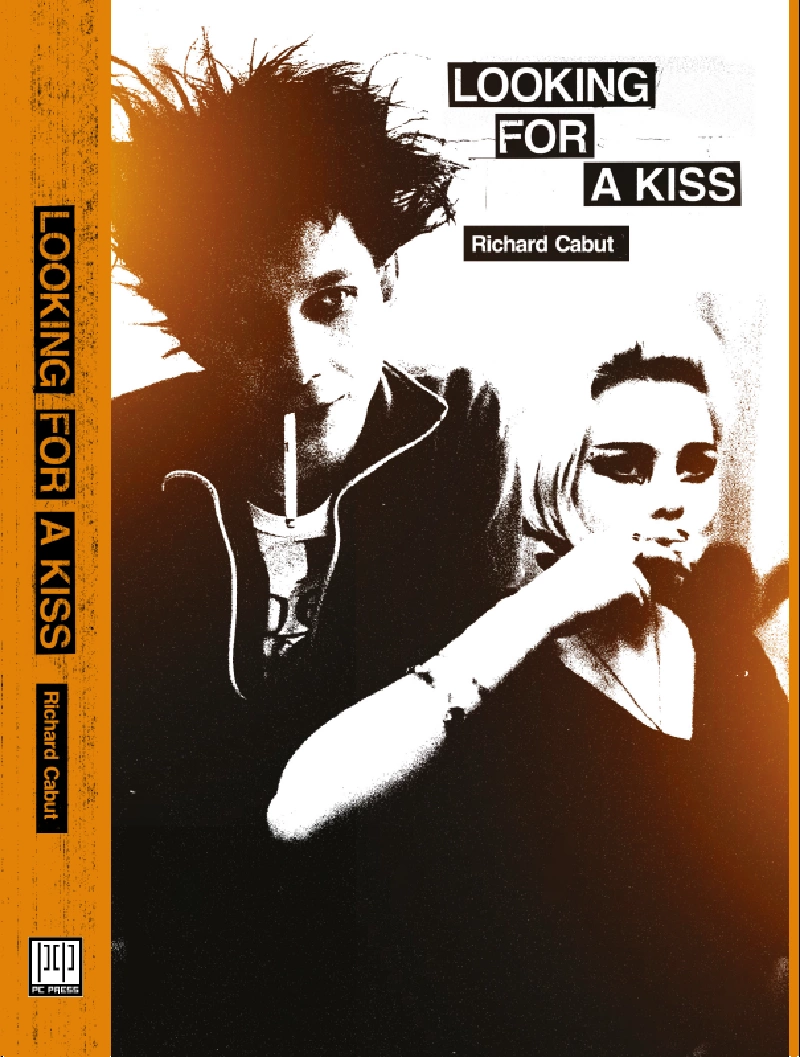Richard Cabut - Interview
by John Clarkson
published: 30 / 8 / 2023

intro
John Clarkson speaks to music journalist Richard Cabut about his reissued debut novel, ‘Looking for a Kiss’ and its forthcoming film adaption.
JIn the early 1980s, young punks, ‘NME’ writer Robert and his confrontational, openly unfaithful girlfriend Marlene drop acid by the Regent’s Canal in Camden in North London. As they set off for home to their flat, their minds initially enhanced and then distorted by the drugs, they find themselves on an increasingly bad trip.... From this premise, 1980’s music journalist Richard Cabut’s masterly debut novel, ‘Looking for a Kiss’, examines broadly the vast changes in London’s landscape over the last forty years, the passing of the original punk movement and the brief positive punk movement of 1982/1983 which Robert in particular is involved with and which was spearheaded by bands such as Southern Death Cult and Sex Gang Children. Focusing also on issues of trust and commitment, it time travels years into the future to find Robert and Marlene long separated but reflecting on their unhappy time together and whether their lives are any better now. ‘Looking for a Kiss’ was originally published in 2020, but has just been reissued in an expanded edition which includes new introductions, and diaries and essays from the 1980s from Cabut (under his original pen name of Richard North) on punk and positive punk. We spoke to Richard Cabut about ‘Looking for a Kiss’ and its forthcoming film adaption. PB: ‘Looking for a Kiss’ has been described by one critic as an “unromance”. Do you think that is an accurate description? RC: Yeah, at one level. The book deals with a couple of cultural arcs. One is a cultural arc and one is a more personal arc, and the cultural arc is punk really and the 1970s, and then it comes to the other level of the arc where punk is really over and also the place where these people live, London, is finished. So it is changing. It is not the ruinous playground that it used to be for them. There is no place in the world for these people or so they feel, and the personal arc intertwines with the wider arc, the social arc if you like. They have invested their emotions and feelings not just into punk rock but into each other, but any romance between them is now dead (Laughs) and their idealism both in the personal and the wider sense hasn’t been fulfilled. PB: Both Robert and Marlene seem trapped by punk. It seems to be doing more to hold them back rather than move them forward . RC: They have to move forward. The title ‘Looking for a Kiss’ does not really refer to looking for a kiss. They are looking for redemption. They are looking for a way out, a way forward. I think that is really the story. It is an anti coming-of-age story. By that I mean it is anti in that they don’t come of age. They are still looking for a kiss. PB: Marlene comes across as a really unpleasant person, but you make her vulnerable at the same time. She is mourning the loss of her dad, but at the same time she is absolutely dislikeable. Her language is horrendous and her favourite word is ‘cunt’ and she treats Robert with constant nastiness and cheats on him frequently. Did you intend to make her as unpleasant as she comes across? RC: Not really. Some people really love Marlene, but others really hate her. I know people who have said that they couldn’t get more than halfway through the book because they hated that character so much (Laughs). I have also written plays in the past. As a playwright, they tell you. “Don’t write the characters as unlikeable.” It is going to turn people off within the context of a play as they are watching it in the theatre, but I think that in books you can get away with more. I hope that there is a nuance to her character. I don’t think that she is a cardboard cut-out. We are all going to come across people like that. There are plenty of people like Marlene. I think that she learns more slowly than anyone else, The book has been picked up by a screenwriter, an American. I was contacted by this great guy in Seattle, and he is a scriptwriter for the American film festival circuit and loved ‘Looking for a Kiss’, and he said, “Can I do a screenplay for it?” He’s pretty much finished, and I can’t wait until Marlene is portrayed on the screen (Laughs).She is going to be funny. For me she makes me laugh, but she has got a really sad side to her. There is a lot of trauma going on in the background there. Trauma is another undercurrent of the book. There is personal trauma, but there is the wider trauma that society is going through with money really, deregulation, redevelopment. If you don’t buy into that, or are not able to buy into that, like Robert and Marlene, then you will wind up in a pretty dark place. PB: You said in your introduction that ‘Looking for a Kiss’ is not true, yet there seems to be a large dollop of truth about it in that Robert’s family come originally come from Eastern Europe as yours do, you lived in Camden for a long time and like Robert you worked for t4he music press. . At what point does autobiography end and fiction take off? RC: It is a mixture of fiction and truth really. Some of the bits really happened and some of it didn’t happen, but, as I go into in the introduction, did all of it happen? No. Is it all true? Yeah. I ran with some quotes there from CS Lewis and Tom Stoppard and JM Coetzee. They all stressed when they were discussing the idea of truth and the idea of biography and truth within biography that imagination tells more of the truth than the so-called facts Even if I sat down when I was writing the book and remembered and wrote down what I remembered which I didn’t although some of it did happen and some of that character is based on me, memory is so often rewriteable. You remember things as you want to remember them. You recalibrate it. You set it into a context that you are comfortable with to put it into a particular story that you are telling yourself and in my case others. You can recreate the truth. What happened is often not what you say happened or how you remember it. It’s not all fiction really, although some of it is. PB: The book was originally published in 2020. Why have you decided to bring it out again so quickly and what have you added to it? RC: The book had come out originally a few years ago. It was with a tiny publisher who had no distribution whatsoever, and it came to the3 end of the deal with them. I signed a two year deal to see how it went and so it finished but it went really well. It sold well and more importantly than that it captured the imagination of the screenwriter and it got picked up by another company PC Press, who are great. They are another independent, but they have got bigger distribution and a good network but they have the same ideals as I do, so they were the perfect people to go with. I thought that we could boost up the package a bit and offer more. People asked about the post-punk and the positive punk basis to the characters’ history. They wanted to know about that, and so I added three non-fiction pieces, the first relating my own punk history and I also included an article that I wrote about positive punk for ‘NME’ in 1982 and published in 1983, but also another piece I wrote about punk in 1977 as well. Cathi Unsworth. who wrote ‘Season of the Witch’, also wrote an introduction , and Jeff Young, who is the author of ‘Ghost Town’, a book about Liverpool, and is also a scriptwriter for ‘EastEnders’ and ‘Holby City, also contributed a piece. I added extracts from my diary at the time,an appendix, and some other photos from the era . It was just a chance to spruce it up and get it through to more people as I don’t think that it has realised its potential in some respects. The characters haven’t fulfilled their spark yet, and I knew about the film as well and I didn’t want the book to be out of print when it was ready as that would have been crazy. PB: Do you know when the film is going to be made? RC: It all depends upon money and it all takes a long time. We have got a script and we have got interest from a producer who has in the past had some experience of punk films, so it is looking good at the moment. PB: Thank you.
Band Links:-
https://www.richardcabut.com/https://www.facebook.com/people/Richard-Cabut
https://twitter.com/richardcabut
Play in YouTube:-
Picture Gallery:-


most viewed articles
current edition
Tossing Seed - InterviewWaterboys - Roundhouse, London, 1/6/2025
Last of the Lovely Days - Interview
Brian Wilson - 1942-2025
Cary Baker - Down on the Corner: Adventures in Busking and Street Music
Lemonheads - O2 Ritz, Manchester, 16/8/2025
Morrissey - Photoscapes
Belouis Some - Video Vault
Motorcycle Boy - Interview
Robert Forster - Interview
previous editions
Flip Side - Raging PagesStereogram Revue - Voodoo Rooms, Edinburgh, 2/12.2015
Bob Mould - Brooklyn Bowl, O2 Academy, London, 11/2/2016
John Clarkson - A Life in Music
Bill Hicks - Profile
Ain't That Always The Way - Alan Horne After The Sound of Young Scotland 2
School - Interview
Miscellaneous - Minehead, Somerset, 8/5/2009...10/5/2009
That Petrol Emotion - That Petrol Emotion, Town and Country Club, London, 1988
Dave Greenfield - 1949-2020
most viewed reviews
current edition
Liarbilitys - VandalheartKirk Adams and Ed Woltil - Eat The Sunshine, Drink The Starshine
Big Flame - Peel Sessions 84-86
Wolf Alice - The Clearing
Silver Biplanes - Coming Up For Air
Good Charlotte - Motel du Cap
Bruce Dickinson - More Balls to Picasso
Suzie Ungerleider - Among The Evergreens
Phew, Erika Kobayashi,, Dieter Moebius - Radium Girls
Rupert Wates - Father to the Man
Pennyblackmusic Regular Contributors
Adrian Janes
Amanda J. Window
Andrew Twambley
Anthony Dhanendran
Benjamin Howarth
Cila Warncke
Daniel Cressey
Darren Aston
Dastardly
Dave Goodwin
Denzil Watson
Dominic B. Simpson
Eoghan Lyng
Fiona Hutchings
Harry Sherriff
Helen Tipping
Jamie Rowland
John Clarkson
Julie Cruickshank
Kimberly Bright
Lisa Torem
Maarten Schiethart